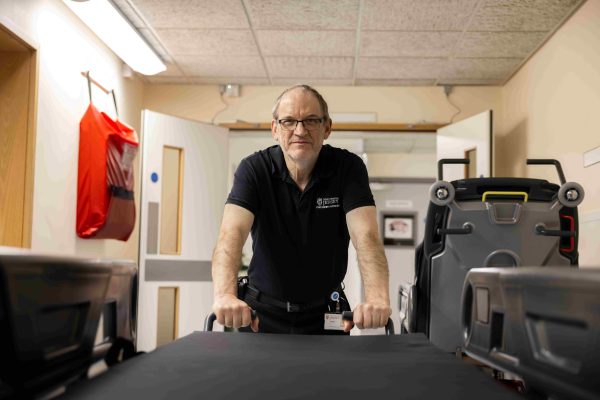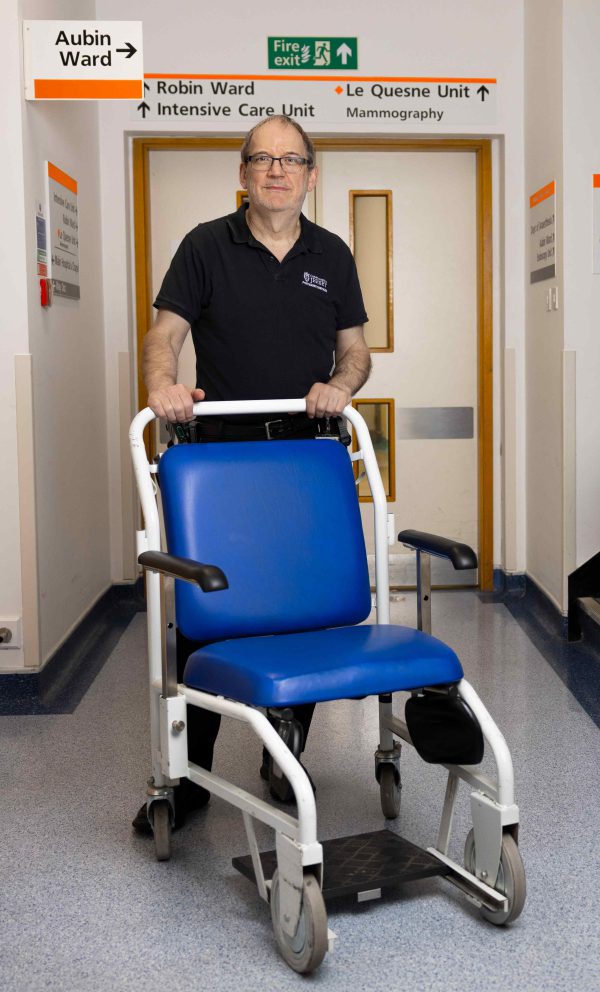
After 25 years working in retail, Robin Boleat joined the public service as a porter at the General Hospital and 15 years later, he still looks forward to work every day.
Working with people has always been the most rewarding part of the job for Robin. However, after 25 years in retail he was ready for a new challenge: “I’m definitely a people person but I felt the time was right for a change. When the opportunity came along to work at the General Hospital, I thought I’d apply but I never imagined I’d get the job because there were a lot of applicants. I’m delighted that I did.”
As an Islander, Robin remembers visits to the General Hospital as a youngster back in the Sixties “to get patched up” after different scrapes and adventures. His connection runs deeper with his mother having worked as a nurse for many years and his children having been born in the Maternity Department.
“I feel a part of the community,” he explained. “I know many of the patients personally who may have been former customers or members of my extended family. It is rewarding when you can help people that you know.”
Robin feels the role of porter enables him to continue working with people and make a positive difference to their lives. He thrives on the fact that no two days are ever the same.
In the simplest terms, a porter moves patients, equipment and medical supplies around the hospital, but there is far more to the job. Robin describes the role as assisting and helping patients and doing the jobs that allow the doctors and nurses to focus their attention on providing the medical care.
“Clearly moving patients from A to B is one of the most important things we do. We are assisting doctors and nursing staff in moving patients and helping with anything else that they may need, like delivering equipment, medical records or medication. It is a big list but the variety of the jobs we do is very stimulating,” he explained.
The most rewarding part of the job is helping in Maternity, “because 99 per cent of the time it is wonderful because the patients are not actually ill,” Robin said.
On the other side of the coin, the most challenging part of the job, but one that Robin also enjoys, is working in the Emergency Department. “Sometimes you find people with very challenging behavioural issues. It can be patients with dementia, illness, excessive alcohol or drugs. You have to do your best to assist people who, unfortunately, don’t always appreciate your help,” he said.
Robin feels that it is important not to take things personally and remain calm, patient and polite. “Sometimes you can feel a bit upset when patients say and do things they wouldn’t normally do, but the next day when you see them again, they are feeling better and they are as nice as pie and don’t remember what they said the day before. Some patients’ behaviour can be quite challenging at times, but you have to remain professional,” he said.
Collaboration with other departments is an essential part of the job. “We work closely with all the departments. I feel lucky that I don’t have responsibility for what is happening as long as I’m doing my part correctly. When you are in the Emergency Department and you have one of the senior consultants with you, you just have to follow their direction and that’s easy and very rewarding work.

“Teamwork is everything. We are a great team with very good line managers who back us up. We often work with a number of people from other departments but we are all striving for the same goal. It is all about the patients and working together to help them get well.”
“Teamwork is everything. We are a great team with very good line managers who back us up. We often work with a number of people from other departments but we are all striving for the same goal. It is all about the patients and working together to help them get well. We then try to get them back home as quickly as possible. We are all helping society to tick along.”
Asked to describe moments in his career that gave him particular pride, Robin’s age and life experience have helped him relate to patients and be able to respond with empathy and understanding.
On one occasion he was engaging with a man with Alzheimer’s who thought he was on a building site waiting for his brother to arrive with a van. “I started talking to him about vans and because I wasn’t that much younger than him, we had a connection. At one point I asked him about a picture on the wall and he seemed to recognise his younger son, and he then started telling me a story about his boy and just for a minute he was back with us. It was quite moving at the time for me.
“On another occasion, I was chatting to a gentleman who knew he would be passing soon from terminal cancer, and it was a pleasure to listen to him talk about his life and his year in remission.”
He was nominated for an outstanding contribution to patient experience award and received a letter written by his line manager. “It said some very complimentary things about me which was lovely, but I accepted the award on behalf of the whole team.”
How does Robin balance the demand of frontline work and his own wellbeing? “It can be difficult to switch off sometimes, but I’m lucky portering is the type of role that you can walk out of the hospital at the end of your shift and know that there is someone else continuing that care for the patients.
“Sometimes you meet people out of work, and they recognise you and thank you for helping them during their time in hospital, which is really nice.”
Robin feels the role has helped him grow professionally and personally. And for those considering a career as a porter he can still remember doing tasks for the first time that he now takes in his stride.
“When you first enter a medical establishment with no previous experience you definitely lack confidence. I remember helping to take a patient who was on a ventilator from the Intensive Care Unit to the CT scanner. I was petrified, but now that is quite a common occurrence and something I feel very confident doing.”
He explained that porters have access to regular training and he would encourage other people to consider this rewarding career in the Public Service: “If you want to shine on your own then I suggest a different career path, but if you want to be part of a team and help other people then certainly, this career would be for you.
“Don’t be put off by some of the sights and smells that you may come across, you get used to this very quickly. I thoroughly enjoy it. It’s very rewarding working for the Government.”
It is the people he works with, patients and fellow staff, that keep him motivated and passionate about the job. And Robin is excited for the future of the department: “We are all looking forward to the new hospital at Overdale. I may be retired by the time it opens, but I will be watching with interest to see how that develops.”

 blog.gov.je
blog.gov.je